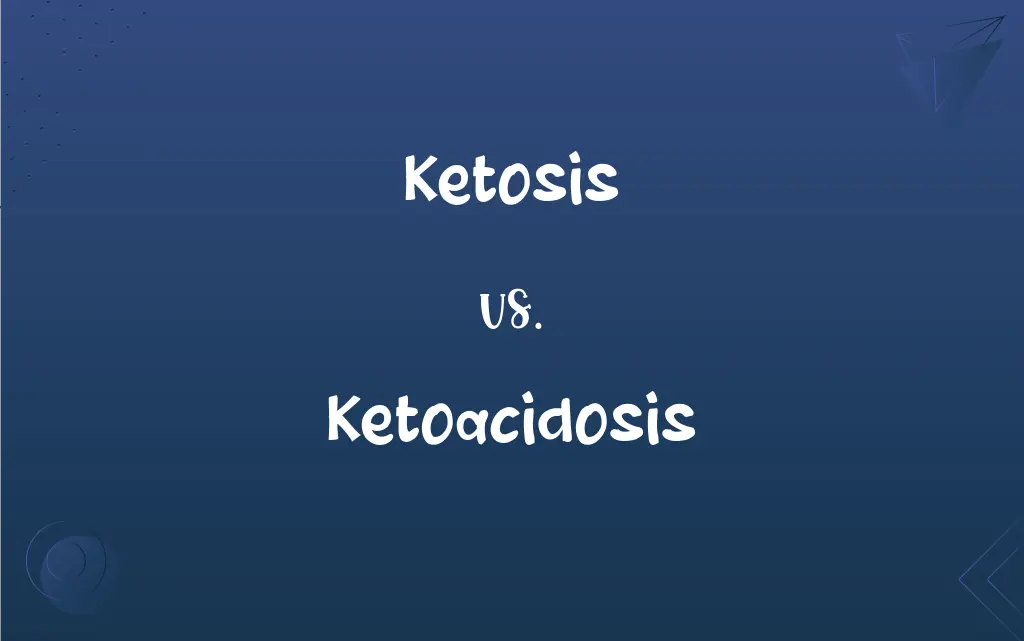Ketosis vs. Ketoacidosis: What's the Difference?
Edited by Aimie Carlson || By Harlon Moss || Updated on October 28, 2023
Ketosis is a metabolic state where the body uses ketones for energy, while ketoacidosis is a dangerous condition with excessively high ketone levels leading to blood acidification.

Key Differences
Ketosis is a natural metabolic state that occurs when the body is deprived of glucose, leading it to break down fats into ketones for energy. This can be achieved through fasting or a ketogenic diet. Ketoacidosis, on the other hand, is a severe medical condition that arises when the concentration of ketones in the blood becomes dangerously high.
While ketosis is often sought after in weight loss strategies and specific diets, ketoacidosis is always undesirable and can be life-threatening. This is because the excessive ketones in ketoacidosis lead to the blood becoming too acidic, which can damage internal organs.
Many people intentionally achieve ketosis by following a low-carbohydrate, high-fat diet. This metabolic state can aid in fat burning and improved brain function. Conversely, ketoacidosis is most common in people with type 1 diabetes who fail to manage their insulin levels, resulting in a dangerous rise in both blood sugar and ketone levels.
It's essential to understand that not all ketone production leads to ketoacidosis. In ketosis, the increase in ketones is moderate and controlled, providing an alternative energy source for the body. However, in ketoacidosis, the ketone production is unchecked and, when combined with high blood sugars, becomes a critical medical situation.
To put it simply, ketosis is often a desired state for those looking to optimize their metabolism or lose weight. Ketoacidosis, in stark contrast, is a severe condition that requires immediate medical attention and intervention.
ADVERTISEMENT
Comparison Chart
Definition
Metabolic state using ketones for energy.
Dangerous condition with excessive ketones acidifying blood.
Cause
Low carbohydrate intake or fasting.
Uncontrolled diabetes, especially type 1.
Ketone Levels
Moderate increase.
Extremely high increase.
Health Implications
Beneficial for weight loss and metabolism.
Life-threatening, damaging to organs.
Typical Occurrence
Dieting, fasting.
Mismanaged diabetes, certain illnesses.
ADVERTISEMENT
Ketosis and Ketoacidosis Definitions
Ketosis
Ketosis results from the breakdown of fats into ketone bodies.
During prolonged fasting, ketosis ensures that the brain has a consistent energy supply.
Ketoacidosis
Ketoacidosis is a medical emergency with high blood acidity from excessive ketones.
She was rushed to the hospital when her symptoms pointed to ketoacidosis.
Ketosis
Ketosis can support weight loss by promoting fat metabolism.
She noticed improved weight loss results after maintaining ketosis for several weeks.
Ketoacidosis
Ketoacidosis results from uncontrolled ketone production and elevated blood sugar.
High levels of glucose and ketones in his blood confirmed a diagnosis of ketoacidosis.
Ketosis
Ketosis involves the liver producing ketones from fatty acids.
To fuel his workouts, he relies on ketosis for sustained energy without carbs.
Ketoacidosis
Ketoacidosis symptoms include rapid breathing, nausea, and confusion.
Recognizing the early signs of ketoacidosis can be life-saving, especially for diabetics.
Ketosis
Ketosis is a metabolic adaptation to using fats as the primary energy source.
When carbohydrates are limited, the body enters ketosis to meet its energy needs.
Ketoacidosis
Ketoacidosis can damage organs due to the blood's increased acidity.
Early intervention is crucial to prevent organ damage from ketoacidosis.
Ketosis
Ketosis is a state achieved on low-carb, high-fat diets.
Many on the ketogenic diet monitor their ketone levels to ensure they remain in ketosis.
Ketoacidosis
Ketoacidosis primarily affects people with type 1 diabetes.
Without adequate insulin management, those with diabetes can develop ketoacidosis.
Ketosis
A pathological increase in the production of ketone bodies.
Ketoacidosis
Metabolic acidosis caused by an abnormally high concentration of ketone bodies in the blood and body tissues.
Ketosis
(pathology) A metabolic state in which the body produces ketones to be used as fuel by some organs so that glycogen can be reserved for organs that depend on it. This condition occurs during times of fasting, starvation, or while on a ketogenic diet.
Ketoacidosis
This condition occurring as a complication of untreated or improperly controlled diabetes mellitus, especially type 1 diabetes, characterized by thirst, fatigue, a fruity odor on the breath, and other symptoms, and having the potential to progress to coma or death. Also called diabetic ketoacidosis.
Ketosis
An abnormal increase of ketone bodies in the blood as in diabetes mellitus
Ketoacidosis
A severe form of ketosis, most commonly seen in diabetics, in which so much ketone is produced that acidosis occurs.
Ketoacidosis
Acidosis with an accumulation of ketone bodies; occurs primarily in diabetes mellitus
FAQs
How can one achieve ketosis?
Ketosis can be achieved through a ketogenic diet, fasting, or drastically reducing carbohydrate intake.
How is ketoacidosis dangerous?
Ketoacidosis results in high blood acidity from excessive ketones, potentially damaging internal organs.
Who is most at risk for ketoacidosis?
Individuals with type 1 diabetes who don't manage their insulin levels are most at risk.
How can one treat ketoacidosis?
Ketoacidosis requires immediate medical attention, typically involving insulin therapy and fluid/electrolyte replacement.
What is ketosis?
Ketosis is a metabolic state where the body uses ketones as a primary energy source due to carbohydrate deprivation.
Can ketosis lead to ketoacidosis?
While both involve ketones, nutritional ketosis is typically safe, whereas ketoacidosis is a dangerous medical condition.
Can you measure ketone levels at home?
Yes, ketone levels can be measured using urine strips or blood ketone meters.
Is ketosis sustainable long-term?
Some individuals maintain ketosis long-term, but it's essential to ensure nutritional needs are met.
Can stress lead to ketoacidosis?
Stress can elevate blood sugar levels, increasing the risk of ketoacidosis in susceptible individuals.
Is there a difference between ketosis in dieters and diabetics?
Yes, dieters usually enter a controlled, nutritional ketosis, while diabetics risk ketoacidosis if not managing their condition.
Is ketosis beneficial for everyone?
While many find benefits, individuals should consult a healthcare provider before making drastic dietary changes.
What foods support ketosis?
Foods high in fats, moderate in proteins, and low in carbs, like avocados, meat, and certain dairy, support ketosis.
What's the link between fasting and ketosis?
Fasting deprives the body of glucose, prompting it to enter ketosis for energy needs.
How long does it take to enter ketosis?
Typically, it takes 2-4 days of eating 20-50 grams of carbs per day to enter ketosis, but it varies.
Are there tests for ketoacidosis?
Yes, blood tests can measure ketone and blood sugar levels to diagnose ketoacidosis.
Can exercise influence ketosis?
Yes, exercise can deplete glycogen stores, potentially accelerating the onset of ketosis.
What symptoms indicate ketoacidosis?
Symptoms include excessive thirst, frequent urination, nausea, abdominal pain, and rapid breathing.
Is ketoacidosis reversible?
With prompt medical treatment, yes, but it can be fatal if left untreated.
How does high blood sugar relate to ketoacidosis?
Uncontrolled high blood sugar in conjunction with high ketones can lead to ketoacidosis in diabetics.
How does alcohol affect ketoacidosis?
Alcohol can increase the risk of ketoacidosis in diabetics by reducing the liver's ability to produce glucose.
About Author
Written by
Harlon MossHarlon is a seasoned quality moderator and accomplished content writer for Difference Wiki. An alumnus of the prestigious University of California, he earned his degree in Computer Science. Leveraging his academic background, Harlon brings a meticulous and informed perspective to his work, ensuring content accuracy and excellence.
Edited by
Aimie CarlsonAimie Carlson, holding a master's degree in English literature, is a fervent English language enthusiast. She lends her writing talents to Difference Wiki, a prominent website that specializes in comparisons, offering readers insightful analyses that both captivate and inform.
































































